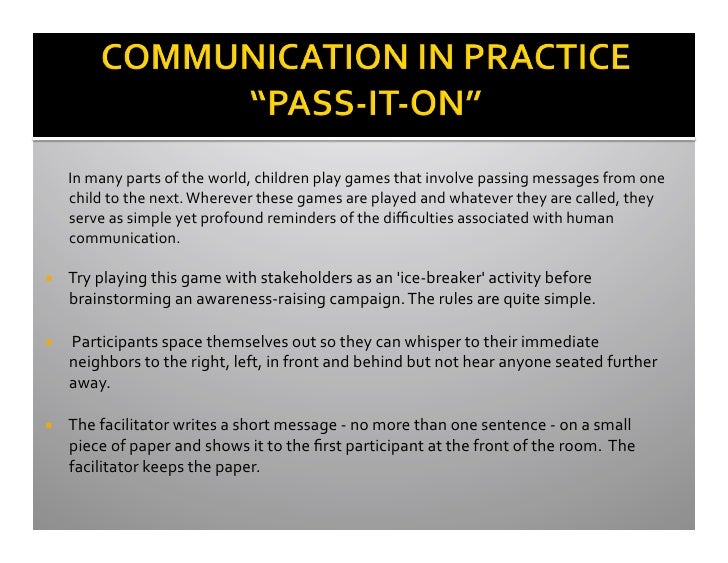Pass The Message Game Phrases
Gossip, Rumors, and the Two-Part Telephone Game By Kids LOVE to play the Telephone Game! Each school year I’m eagerly asked when the game will be played. I use it as a classroom counseling lesson to help children understand the impact of gossip and rumors. It’s an excellent lesson for both boys and girls, because not only “mean girls” use these methods of emotional bullying. Boys have friendship problems and are targets of relational aggression, too. This year I added a twist and a tally with the Telephone Game.
I added Part 2 to the classic game and tallied up the results. It proved illuminating for the kids and me while packing a wallop of understanding! The Two-Part Telephone Game The traditional Telephone Game is played with a group of kids, preferably with a number between 15 – 25 participants.
One person starts with a simple message and whispers it into the next person’s ear. The process continues until the last person announces the message she heard. The message is then compared to the original message. Of course, the final message has morphed from the original.

The Two-Part Telephone Game begins like the classic game. I start it with an emotionally charged message. With co-ed groups I like to use: It’s said that girls are smarter than boys (or vice versa). After the message travels through the group and the first and last messages are compared, I provide the following worksheet to the kids. This is Part 2. Telephone Game: How Words Change Accidentally and On Purpose Put a check mark by the numbers that best explain what happened to you when you played the telephone game.

I listened the best I could. I was anxious to pass the information on, so I might not have listened the best I could. I asked for the words to be repeated when I couldn’t hear them. I got frustrated trying to figure out the message, so I passed along the words the best I could. I changed the message on purpose just for fun.
I changed the message on purpose, because I thought the other person got the message wrong. I changed it to what I thought it should be. I didn’t want to pass the message along, because I didn’t think the message was correct. I thought the message was hurtful, but I passed the message on anyway.

I thought the message was hurtful, so I changed the words. I only passed the message along, because I was forced to do so. The students are NOT to put their names on their worksheets, because honest answers are desired. After collecting their completed work, I write the numbers 1 – 10 on the board and tally the check marks corresponding to each number.
We then talk about gossip and rumors as they relate to each number. Here’s a sample of what kids can learn with the Two-Part Telephone Game. Some people like to listen to rumors and gossip. Some people like to pass on gossip and rumors. Information passed on may not be exactly the way things happened.
Messages change from person to person the more the story is told. Some people are careful to get the information right and some people aren’t. Even when people don’t understand the gossip or rumors, some people pass them along anyway.
There are different agendas for spreading gossip and rumors. You may never know why a message changes from mouth to mouth. Incorrect information gets passed along all the time. It’s important to verify ANY second hand information. Hurtful messages often travel faster than other information. My students loved seeing the tallied results! It resulted in rich discussion.
Pass The Message Game Phrases For Christmas
You can use this game with ages eight through adulthood. It works in classrooms, before and after school programs, sleepovers, sports groups, or anywhere a group of kids gather. Let us know if you use the Two-Part Telephone Game, and tell us how it worked for you.
Write a comment about it, and we will enter you in a drawing to win a “When Others Bully You” poster from A Way Through. Drawing will be held on March 31. © 2010 A Way Through, LLC WANT TO USE THIS ARTICLE IN YOUR EZINE OR WEB SITE? You can, as long as you include this complete blurb with it: Female friendship experts Jane Balvanz and Blair Wagner publish A Way Through, LLC’s Guiding Girls ezine. If you’re ready to guide girls in grades K – 8 through painful friendships, get your FREE mini audio workshop and ongoing tips now.
Untitled Document Do you need help in guiding your daughter through a difficult friendship situation? Finally, 1-on-1 personalized help is available to assist you in guiding your daughter through her friendship problems now! Introducing a new way to get support Our new Quick Assist program has been developed for parents who want help that’s tailored to their specific situation.
Through no-nonsense strategy sessions, you will gain clarity on what to say to your daughter, what not to say, and how you can become a source of inspiration and support for her.